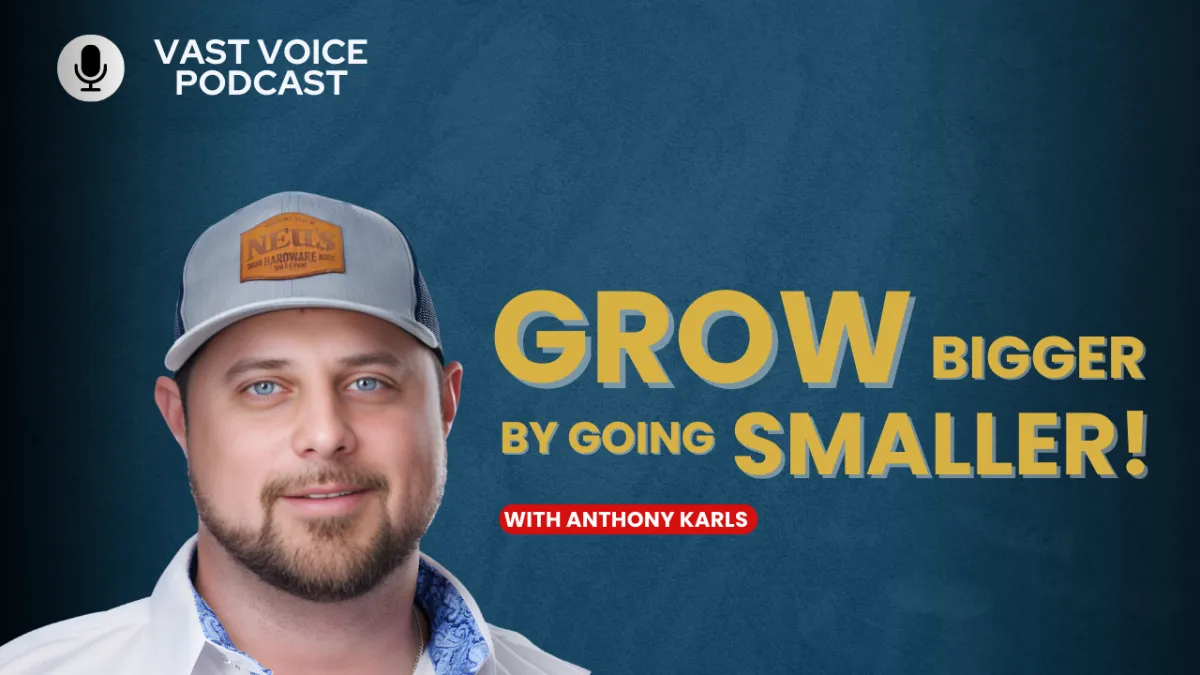
Grow Bigger By Going Smaller!
The conversation centers on how niching down transformed both a law firm and a marketing agency into a highly scalable, efficient business. Anthony Karls, president of Rocket Clicks, explains that instead of serving “everyone,” they chose a very specific market: family law firms. That extreme focus gave them major advantages—clearer messaging, streamlined operations, easier hiring (because candidates know exactly what the company does), and stronger culture. Rather than being a generalist agency working with all kinds of businesses, Rocket Clicks focuses almost entirely on helping family law practices grow.
Anthony shares the origin story: their law firm originally launched as a general practice and grew quickly, but the results were mediocre. Customer service scores were average, the team didn’t feel proud of the impact they were making, and the business felt scattered. About 18 months in, they made a radical decision—refund about 60% of their clients and cut the staff in half over a 30-day period, shifting fully into family law. Surprisingly, even in that transition year, revenue stayed at around $1.3M. After that, the power of the niche kicked in: the firm grew to roughly $3M, then $6M, then $9M in subsequent years, simply by getting very good at one thing and repeating the same playbook in more territories.
From a marketing standpoint, Anthony emphasizes starting with organic traffic rather than jumping straight into paid ads. For a typical $2M family law firm living off referrals, he would first focus on local search: making sure the firm shows up in Google Maps and top organic listings. That starts with getting listed correctly in key data aggregators and building consistent NAP (Name, Address, Phone) citations across the web. Then they work on internal linking and content to rank for long-tail, high-intent search terms. Once the organic foundation is solid and the intake team knows how to handle non-referral leads (who don’t already “trust grandma’s recommendation”), then it makes sense to layer on paid ads.
When it comes to paid advertising, Anthony says the real power comes from data feedback. Most firms only track phone calls and web form submissions, which produces a lot of junk leads and wasted spend. Rocket Clicks instead tracks leads all the way through the funnel to the “quote” or similar high-value stage, then sends that conversion data back to Google and Meta. That allows the ad platforms’ AI to optimize toward the right kind of client, not just anyone who fills out a form. On budgeting, he suggests that a healthy, growing firm might invest roughly 6–8% of revenue into marketing and 2–4% into intake/sales, leaving strong margins for operations, HR, leadership, and profit—and building a business that’s actually sellable because it runs on systems, not just the owner’s personal hustle.
The agency also helps attorneys with content and social media in a way that minimizes the lawyer’s workload. They maintain a large library of content topics (hundreds of potential pages and themes), then have attorneys simply record themselves talking about those topics via Zoom or similar tools. Rocket Clicks turns that raw recording into long-form content, short clips, reels, and website pages—multiple formats built around the same core message. Internally, their culture is high-performance and competitive, inspired by elite athlete mindsets but without the toxicity: agile teams, high standards, and accountability, all aimed at making marketing the “tip of the spear” rather than a cost center.
Finally, Anthony highlights two big underused levers: artificial intelligence and website performance. On the law firm side, they use AI agents to handle unanswered calls, collect intake details, and assist attorneys with inbox management. On the marketing side, they use AI for research, sentiment analysis, and measuring topic relevancy so a brand can be seen as an authority by both search engines and AI systems. He also stresses that many firms are leaking opportunity because their websites are slow and poorly optimized on mobile, even though 70%+ of visitors come from phones. Fixing speed and mobile usability alone can significantly boost leads. Overall, the message is clear: niche down, build systems, respect your data, and treat your website and marketing as strategic assets if you want to grow from “just a job” into a scalable, valuable business.
Takeaways
• Niching down allows for more efficient messaging and operations.
• Specialization can lead to significant business growth.
• Investing in marketing is crucial for scaling a business.
• Organic traffic should be prioritized before paid advertising.
• Data infrastructure is essential for effective ad campaigns.
• Social media content should be part of a comprehensive marketing strategy.
• AI can enhance both marketing and operational efficiency.
• Website speed is a critical factor in lead generation.
• Systems and processes create passive revenue opportunities.
• Continuous learning and adaptation are key to business success.
Sound Bites
• Niching down gives you a bunch of advantages.
• Systems equal passive revenue.
• AI has changed the way we think about SEO.
Listen & Subscribe for More:
🎧 The Vast Voice Podcast → Available on Spotify & Apple Podcasts
▶️ Subscribe on YouTube (@VastSolutionsGroup.com) for expert insights 🚀
📚 Don’t miss Modern Millions by R. Kenner French – the #1 BEST SELLING Amazon book (Entrepreneurship category) 👉 ModernMillions.ai
📚 Amazon Top Selling Author→ https://www.amazon.com/dp/B0FHBS32LG
Got Questions? Reach Us Anytime:
📞 415-212-8189
🕗 Monday–Thursday | 8:00 AM – 5:00 PM (Pacific)
🙏 Thank you for listening & supporting!
